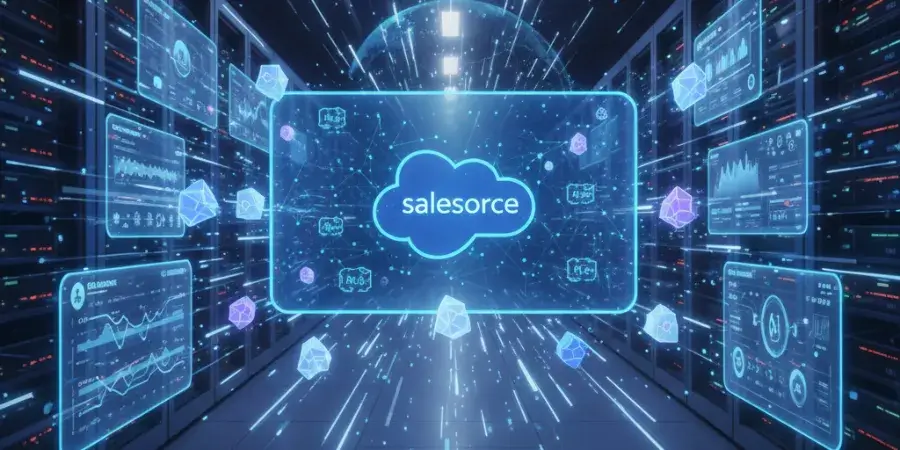Salesforce just fired its opening salvo in the enterprise AI arms race. On October 13, the CRM giant launched Agentforce 360 globally—a comprehensive AI agent platform designed to transform how businesses integrate artificial intelligence into daily operations. CEO Marc Benioff isn’t positioning this as workforce replacement technology; instead, he envisions the “Agentic Enterprise” where AI amplifies human capability rather than supplanting it. With 12,000 customers already onboard and early deployments delivering efficiency gains exceeding 80%, Salesforce is making an aggressive play for dominance in a market projected to balloon from $5.9 billion today to $105.6 billion by 2034.
Early Results Show Dramatic Efficiency Gains
Numbers tell the Agentforce story more convincingly than marketing messaging ever could.
Reddit automated 46% of support cases while slashing resolution times by 84%—dropping average response time from 8.9 minutes to just 1.4 minutes. For a platform handling millions of user interactions daily, that efficiency improvement translates directly to cost savings and user satisfaction metrics.
OpenTable achieved 70% autonomous resolution of support cases, freeing human agents to handle complex reservations requiring judgment and personalization. Meanwhile, employment services firm Adecco demonstrated Agentforce’s always-on capability by handling 51% of candidate interviews outside traditional business hours—a game-changer for global talent acquisition where time zones create coordination challenges.
These aren’t pilot projects with carefully curated use cases. They represent production deployments at scale across diverse industries, validating Salesforce’s claim that AI agents can deliver immediate operational impact when properly integrated into existing workflows.
Agent Script: Programming AI Behavior with Conditional Logic
One of Agentforce 360’s most significant innovations addresses a persistent challenge in enterprise AI: predictability.
Agent Script, launching in beta this November, allows users to program AI agent behavior using conditional “if/then” logic—essentially creating decision trees that guide agent responses in complex scenarios. This matters because enterprises can’t afford AI that occasionally produces brilliant insights but unpredictably generates inappropriate responses in edge cases.
By combining traditional rule-based programming with AI’s pattern recognition capabilities, Agent Script provides the control enterprises demand while retaining the flexibility that makes AI valuable. A customer service agent might be programmed: “If the customer mentions a billing dispute exceeding $500, escalate immediately to a human supervisor with full context.” Simple conditional logic, but critical for maintaining service quality standards.
The platform also integrates reasoning models from Anthropic, OpenAI, and Google Gemini that “think before responding”—representing a philosophical shift from pure pattern-matching toward more deliberative AI decision-making. These models pause to consider context, evaluate multiple response options, and select outputs aligned with defined objectives rather than simply predicting the next most probable token.
Agentforce Voice: Transforming Contact Centers
Traditional interactive voice response (IVR) systems are universally despised—and for good reason. They’re rigid, frustrating, and often create more problems than they solve.
Agentforce Voice reimagines phone-based support with natural, real-time conversations powered by ultra-realistic speech synthesis and intelligent call routing. The system handles routine inquiries autonomously while executing seamless handoffs to human agents when situations require empathy, creativity, or complex problem-solving.
Critically, Agentforce Voice integrates with major enterprise contact center platforms including Amazon Connect, Five9, and Vonage—avoiding the rip-and-replace integration nightmare that kills many enterprise software deployments. Organizations can enhance existing infrastructure rather than rebuilding communication systems from scratch.
For industries like healthcare, insurance, and financial services where phone interactions remain primary customer touchpoints, voice-enabled AI agents represent transformative potential for both cost reduction and experience improvement.
Slack Becomes the “Agentic Operating System”
Salesforce’s strategic vision for Agentforce extends beyond standalone AI tools—the company is positioning Slack as the central nervous system for human-AI collaboration across enterprises.
Core business applications including sales CRM, IT service management, and HR systems will be directly accessible through conversational AI within Slack. Rather than context-switching between multiple enterprise applications, employees interact with a unified interface where AI agents retrieve information, execute workflows, and provide proactive recommendations.
A redesigned Slackbot will function as a personalized assistant that learns individual user preferences, work patterns, and information needs—proactively surfacing relevant insights before users even formulate queries. Imagine receiving a Slack notification: “Your meeting with Acme Corp is in 30 minutes. Here’s their latest contract status, recent support tickets, and renewal probability based on engagement patterns.”
This “agentic operating system” concept represents Salesforce’s answer to Microsoft’s Copilot strategy—turning workplace collaboration platforms into AI-powered productivity multipliers rather than just communication channels.
Enterprise AI Market Heats Up: Google, Anthropic Challenge Salesforce
Salesforce’s Agentforce launch doesn’t occur in a vacuum. The $5.9 billion enterprise AI market is experiencing fierce competition as tech giants recognize the massive revenue opportunity.
Google launched Gemini Enterprise on October 9—just days before Salesforce’s announcement—targeting identical enterprise customers with AI agents priced at $30 per user monthly. The timing suggests coordinated competitive positioning as both companies court CIOs planning 2025 technology budgets.
Anthropic secured a landmark deal with Deloitte to deploy Claude Enterprise to 470,000 employees—the AI startup’s largest corporate partnership and a validation of enterprise appetite for diverse AI platforms beyond OpenAI’s GPT ecosystem.
Despite intensifying competition, Salesforce claims a significant lead with 12,000 Agentforce customers—substantially higher than competitor deployments according to company statements. However, market leadership requires sustained innovation as rivals with deep pockets and established enterprise relationships aggressively challenge incumbent positions.
The 95% Failure Rate Challenge
Enterprise AI’s dirty secret: MIT research shows 95% of AI pilots fail before reaching production.
Why such catastrophic failure rates? Integration complexity, unclear ROI metrics, change management resistance, data quality issues, and unrealistic expectations all contribute. Many organizations pilot AI technologies without proper use case definition, adequate training data, or organizational readiness—predictably resulting in expensive failures.
Salesforce’s 12,000-customer base suggests it may be cracking the deployment code through tight integration with existing workflows, pre-built industry templates, and comprehensive training programs. Yet the broader industry challenge remains: moving from impressive demos to production systems delivering measurable business value consistently over time.
Market Reception and Strategic Investment
Investors responded positively to the Agentforce launch, with Salesforce stock rising over 1% in pre-market trading Monday. Analysts maintain a “Moderate Buy” consensus with an average price target of $333.52, reflecting confidence in the company’s AI strategy while acknowledging competitive uncertainties.
Salesforce also announced a $15 billion investment in San Francisco over five years specifically to accelerate AI adoption—a significant commitment signaling long-term conviction in enterprise AI’s transformative potential.
As the Agentic Enterprise vision materializes, one reality becomes clear: AI won’t replace human workers wholesale, but organizations that successfully integrate AI agents into workflows will gain decisive competitive advantages over those that don’t. Salesforce is betting its future that Agentforce 360 becomes the platform powering that transformation.
















